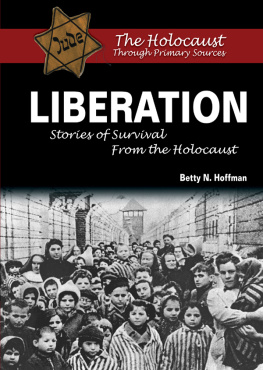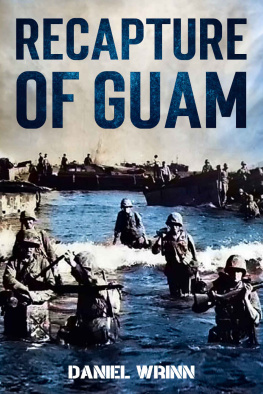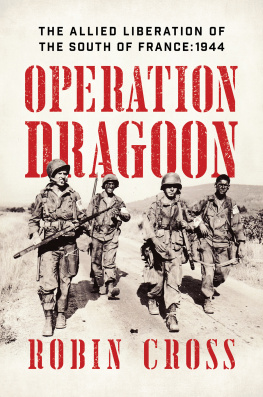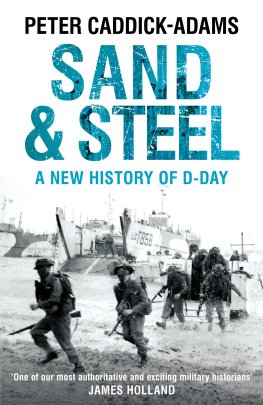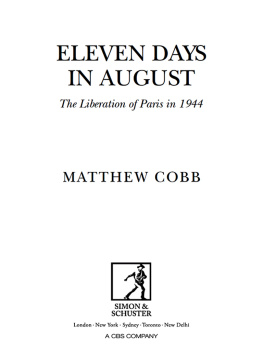Will Irwin - Abundance of Valor: Resistance, Survival, and Liberation: 1944-45
Here you can read online Will Irwin - Abundance of Valor: Resistance, Survival, and Liberation: 1944-45 full text of the book (entire story) in english for free. Download pdf and epub, get meaning, cover and reviews about this ebook. year: 2010, publisher: Presidio Press, genre: Detective and thriller. Description of the work, (preface) as well as reviews are available. Best literature library LitArk.com created for fans of good reading and offers a wide selection of genres:
Romance novel
Science fiction
Adventure
Detective
Science
History
Home and family
Prose
Art
Politics
Computer
Non-fiction
Religion
Business
Children
Humor
Choose a favorite category and find really read worthwhile books. Enjoy immersion in the world of imagination, feel the emotions of the characters or learn something new for yourself, make an fascinating discovery.

- Book:Abundance of Valor: Resistance, Survival, and Liberation: 1944-45
- Author:
- Publisher:Presidio Press
- Genre:
- Year:2010
- Rating:4 / 5
- Favourites:Add to favourites
- Your mark:
- 80
- 1
- 2
- 3
- 4
- 5
Abundance of Valor: Resistance, Survival, and Liberation: 1944-45: summary, description and annotation
We offer to read an annotation, description, summary or preface (depends on what the author of the book "Abundance of Valor: Resistance, Survival, and Liberation: 1944-45" wrote himself). If you haven't found the necessary information about the book — write in the comments, we will try to find it.
Will Irwin: author's other books
Who wrote Abundance of Valor: Resistance, Survival, and Liberation: 1944-45? Find out the surname, the name of the author of the book and a list of all author's works by series.
Abundance of Valor: Resistance, Survival, and Liberation: 1944-45 — read online for free the complete book (whole text) full work
Below is the text of the book, divided by pages. System saving the place of the last page read, allows you to conveniently read the book "Abundance of Valor: Resistance, Survival, and Liberation: 1944-45" online for free, without having to search again every time where you left off. Put a bookmark, and you can go to the page where you finished reading at any time.
Font size:
Interval:
Bookmark:
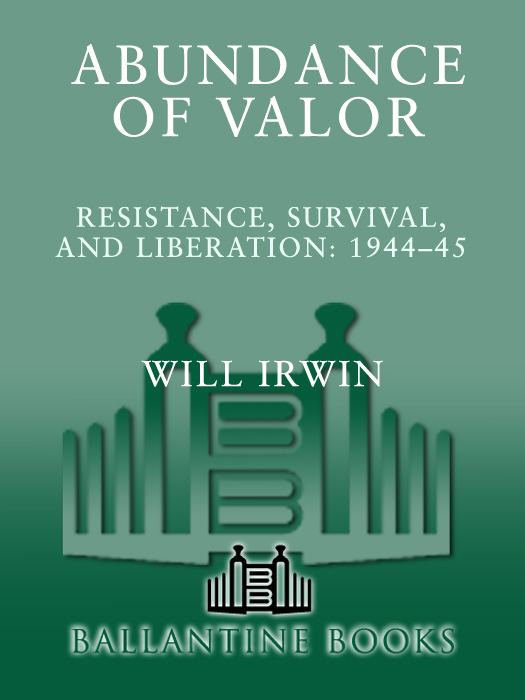
ALSO BY WILL IRWIN
The Jedburghs: The Secret History of the
Allied Special Forces, France 1944
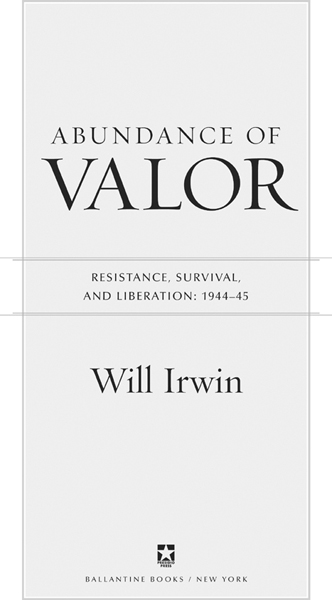
One powerful full-blooded thrust across the Rhine and into the heart of Germany, backed by the whole of the resources of the Allied Armies, would be likely to achieve decisive results.
Field Marshal Sir Bernard Law Montgomery
I think we might be going a bridge too far.
Lieutenant General Sir Frederick A. M. Browning
Not in vain may be the pride of those who have survived, the epitaph of those who fell.
Sir Winston S. Churchill, on Operation Market-Garden
O n the evening of Monday, September 11, 1944, three men strapped on parachutes and climbed aboard a snub-nosed British Stirling, a specially modified four-engine bomber, at a secret airfield in England. Months of rigorous training and painstaking preparation had brought the men to this point. In recent days, they had endured detailed briefings in London, outlining their mission of arming and training the Dutch underground, even last-minute guidance and a personal farewell from Prince Bernhard of the Netherlands royal family.
Bernhard, a German by birth, had married the Dutch princess Juliana in 1937, and although the German national anthem and the Horst Wessel had been sung at the wedding reception, Bernhard held a fervent hatred for the Nazis. When the royal family had fled the Netherlands at the time of the German invasion, he had prudently seen to his familys safe removal to Canada before returning to London to head the Dutch resistance movement.
Days of nervous anticipation followed for the parachutists as their mission first was postponed because of high winds, then was aborted two days later after their plane reached Holland and survived heavy German flak, only to have the pilot turn back when he failed to locate the drop area.
The men made themselves as comfortable as possible in the planes long, slender interior. At ten that night, the Stirling roared down the runway, the four huge Bristol engines on the short wings straining to lift the enormous plane from the runway, then leveling to a steady drone as the bomber headed toward the English Channel. The men tried to relax as the flight continued over the water. Before long, the plane crossed the Dutch coast over the fishing town of IJmuiden, northwest of Amsterdam, and encountered light flak but was not hit.
At twenty minutes past midnight, twenty-nine-year-old Major Henk Brinkgreve, wearing the brown uniform of the Royal Netherlands Army, dropped through the opening in the floor of the Stirling. As eager as the other two members of the team were to get their mission under way, Brinkgreves fervor was more personal, more emotional; he was returning to his homeland for the first time since the 1940 German invasion. The Dutch officer was quickly followed by Sergeant John Austin, the teams British radio operator. Last to leave the plane was Major John Olmsted, an infantry officer from the United States Army who had come to be called Pappy by the others because of the year or two of age he had on them.
The three men were unaware that nearly all of the agents previously dropped into the Netherlands by Britains Special Operations Executivemore than fifty men since 1941had been captured and imprisoned or executed by the Germans. Recent operations had been more successful, but no one could be sure what awaited the three men now approaching Dutch soil.
The reception committeemembers of the underground gathered to meet the team at the drop zone and help remove the parachutists and their accompanying supplies from the area as quickly as possible to avoid detection or capture by the Germanshad extinguished the lights marking the drop zone as soon as the three parachutists had jumped. Brinkgreve and Olmsted had anticipated this unwelcome action, having been briefed that this reception committee was receiving its first drop. The inexperienced resistance fighters were unaware that special operations planes typically required two passes over the small drop zones to deliver both the parachutists and the cargo of twelve man-size cylindrical containers packed with weapons, ammunition, explosives, and other gear that accompanied most special forces teams deploying behind enemy lines. Because of this, Brinkgreve and Olmsted had persuaded the aircrew to reverse the normal procedure, dropping the parachutists on the first pass and the long steel containers on the second.
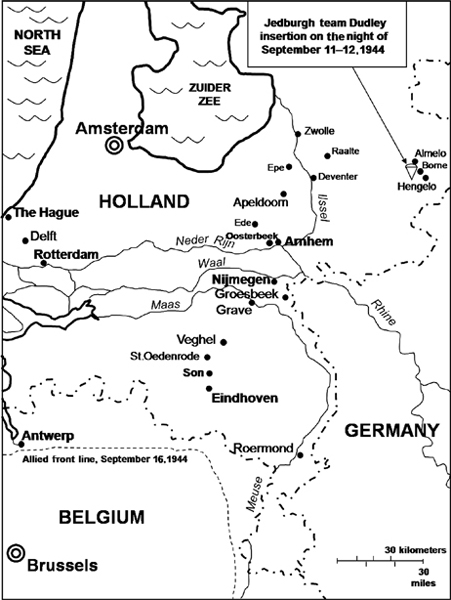
As the three men drifted toward the farmland of eastern Holland, near the town of Wierden and less than six miles from the German border, they spotted a truck convoy not far away. With the nearest Allied ground forces still more than a hundred miles to the southwest, the convoy was certainly German.
Brinkgreve hit the soft pasture turf, collapsing and rolling to one side, leaped to his feet, freed himself from his parachute harness, and quickly located the reception committee chief. He informed the resistance man that the Stirling would be circling for another pass over the field to drop the twelve metal containers. The lights, the major explained, needed to be turned on again at once for the pilot to find the drop zone on the second pass.
Not far away, Major Olmsted and the radio operator gathered up their parachutes. Sergeant Austins carbine had caught on the edge of the opening as he exited the plane, jarring the weapon from his grasp and causing it to become tangled in his parachute. He had somehow managed to descend safely but had landed within only a few feet of Olmsted.
Major Olmsted set out in search of Major Brinkgreve while the radio operator buried their parachutes. The American had not gone far when a shadowy form approached him in the dark. As the figure drew nearer, Olmsted could just make out what appeared to be a German uniform. He drew his forty-five-caliber automatic and cocked the hammer, ready to shoot the intruder.
But the stranger suddenly said, Hallo, pal.
Startled at first by the strange greeting, Olmsted challenged the man for the planned recognition signal and then relaxed when the man gave the correct response. Olmsted lowered the pistol, easing the hammer forward with his thumb, and returned the weapon to its holster. The uniform that had appeared to Olmsted to be German was, in fact, that of a Dutch constabulary force, or gendarmerie, called the Marechaussee. The policeman, in this case, was also an active member of the underground.
Olmsted followed the policeman to a spot where Brinkgreve and the reception committee chief were awaiting the container drop. Along the way, the two men were joined by another man, a Dutchman who had been trained in Great Britain to organize resistance groups in the Netherlands. He and his radio operator had parachuted into the Veluwe region, to the south, nearly two weeks earlier, but they had lost all of their equipment on the jump. The two had since made their way northward into the province called Overijssel (the ij is pronounced like the English word eye).
Brinkgreve had successfully gotten the reception committee to relight the drop zone by the time Olmsted and the two Dutchmen found him. Soon the Stirling could be heard approaching the field on its second pass. As the lumbering, roaring shadow soared overhead, less than eight hundred feet above the men, twelve parachutes opened, one after the other, blossoming against the night sky. The drop was a good one, and in a matter of seconds the containers thudded to the ground.
Font size:
Interval:
Bookmark:
Similar books «Abundance of Valor: Resistance, Survival, and Liberation: 1944-45»
Look at similar books to Abundance of Valor: Resistance, Survival, and Liberation: 1944-45. We have selected literature similar in name and meaning in the hope of providing readers with more options to find new, interesting, not yet read works.
Discussion, reviews of the book Abundance of Valor: Resistance, Survival, and Liberation: 1944-45 and just readers' own opinions. Leave your comments, write what you think about the work, its meaning or the main characters. Specify what exactly you liked and what you didn't like, and why you think so.

